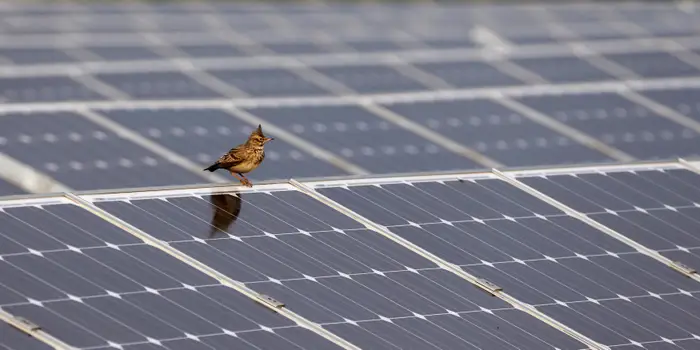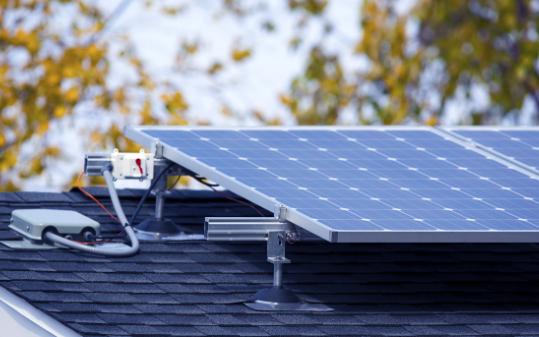A Certified Scrap PV Solar Panel Modules Recycler is very important because it collects old scrap solar panels from around the world and then recycles them into new solar panels that are exactly like new solar panels in their performance and warranty in 2025. This is also informative that On the other hand, getting rid of these solar panels is very bad for the environment because harmful materials could get into the land and water like silicon. To solve this problem, Certified Scrap PV Solar Panel Modules Recycler is very important for ensuring that old solar panels are thrown away in a safe way that doesn’t harm the environment.
This is also very important that These specialized recyclers use cutting-edge technologies to get silicon, copper, and silver out of old things while causing as little loss and damage to the environment as possible nowadays in 2025. Encouraging careful management of e-waste, allowed recyclers to help the solar industry have less of an effect on the environment and promote a more circular system in the world in 2025.
Why Solar Panel Recycling Is Essential?

As the world moves toward sustainable energy, solar power has become more popular. As of 2023, over 1.2 terawatts of solar capacity have been built around the world. But as the first wave of solar panels gets close to their 25–30-year life span, a major problem arises: how to handle photovoltaic (PV) cells that have reached the end of their useful life. The International Renewable Energy Agency (IRENA) says that 78 million metric tons of used solar panels will be thrown away by 2050.
This shows how important it is to have approved scrap PV solar panel module recyclers, who can make sure that waste is thrown away in a way that doesn’t harm the environment and get valuable materials back. This guide talks about what qualified recyclers do, why they’re important, and how to choose them. It makes them important players in the circle economy.
The Circular Economy and Resource Recovery
The cycle economy changes how we deal with old solar panels by putting recovery of resources ahead of dumping. Unlike the usual “take-make-waste” plan, this system makes sure that photovoltaic (PV) cells that are no longer useful are taken apart, processed, and put back together in new products. Solar panels are made of up to 95% recyclable materials, such as silicon, silver, glass, and metal. This can reduce the need for digging and extracting new materials, which uses a lot of energy. One ton of solar panels can be recycled to get back 800 kg of glass and 15 kg of metal. This cuts industrial emissions by up to 70%.
The circular economy lowers the amount of trash that ends up in landfills, stops the polluting of harmful substances like lead, and makes the supply chain more resilient by ending the loop. Chemical washing and AI-driven sorting are two new technologies that make materials even more pure. This lets makers reuse parts in new electronics, panels, and building materials.
Understanding PV Solar Panel Composition in 2025

There we will completely discuss Understanding PV Solar Panel Composition one by one as given below.
- Silicon cells (crystalline silicon in 95% of panels)
- Toxic elements: Lead, cadmium, and polymers
- Valuable metals: Silver, copper, and aluminum
- Glass (up to 75% of panel weight) and plastic layers
Without proper recycling, hazardous substances can leach into ecosystems, while recoverable materials go to waste. Recycling mitigates these risks, reclaiming up to 95% of glass and 85% of metals for reuse.
Why Solar Panel Recycling Matters
- Environmental Protection: Prevents soil and water contamination from lead and cadmium.
- Resource Recovery: Silicon and silver are finite; recycling reduces mining demand.
- Regulatory Compliance: The EU’s WEEE Directive and U.S. state laws (e.g., Washington’s PV stewardship program) mandate recycling.
- Circular Economy: Closing the loop in solar manufacturing slashes carbon footprints.
The Solar Panel Recycling Process in 2025

There we will completely discuss or explore The Solar Panel Recycling Process one by one as under.
- Collection & Transport: Secure logistics to prevent breakage.
- Dismantling: Removal of aluminum frames and junction boxes.
- Shredding: Mechanical crushing to separate glass, metals, and silicon.
- Thermal Processing: Heating to 500°C to burn off adhesives (EVA layers).
- Chemical Treatment: Acid leaching extracts high-purity silicon and silver.
- Material Refining: Ready-to-reuse components sent to manufacturers.
Certification: The Gold Standard for Recyclers
Certifications validate recyclers’ adherence to environmental and safety protocols that are discussed under.
- R2v3: Focuses on responsible material management and data security.
- e-Stewards: Bans exporting e-waste to developing nations.
- ISO 14001: Ensures robust environmental management systems.
- NAID AAA: For companies handling data-bearing devices (e.g., inverters).
Certified recyclers undergo third-party audits, ensuring compliance with OSHA, EPA, and international standards.
Benefits of Choosing a Certified Recycler
There are many Benefits of Choosing a Certified Recycler nowadays and here we will discuss them one by one.
- Legal Compliance: Avoid fines by partnering with recyclers to meet local regulations.
- Environmental Accountability: Guaranteed safe handling of toxic materials.
- Data Security: Proper destruction of inverters with sensitive information.
- Market Trust: Enhance corporate sustainability credentials through transparent reporting.
Challenges in PV Recycling
There are many Challenges in PV Recycling nowadays and here we will discuss them one by one.
- High Costs: Recycling can cost 15–15–30 per panel vs. 1–1–5 for landfill.
- Logistical Hurdles: Transporting bulky panels from remote installations.
- Technical Complexity: Separating laminated layers requires specialized machinery.
- Consumer Awareness: Many users remain unaware of recycling options.
How to Select a Certified Recycler: A Checklist
- Verify active certifications (R2, e-Stewards, ISO).
- Request audit reports and material recovery rates.
- Assess transparency in tracking recycled outputs.
- Confirm partnerships with OEMs for material reintegration.
- Evaluate geographic coverage and pickup services.
The Future of Solar Panel Recycling
There we will discuss this completely The Future of Solar Panel Recycling as given below
- Laser Separation: Non-invasive removal of silicon cells for reuse.
- Solvent-Based Delamination: Eco-friendly chemical alternatives.
- AI Sorting Robots: Enhance material recovery precision.
- Policy Shifts: Extended Producer Responsibility (EPR) laws gaining traction globally.
What Makes a Recycler “Certified”?
A qualified solar panel recycling follows strict global rules to make sure that photovoltaic (PV) trash is thrown away in an honest, safe, and environmentally friendly way. Frameworks like R2v3, e-Stewards, and ISO 14001 support certification, which needs strict third-party checks to make sure that environmental laws, worker safety rules, and the speed of material recycling are being followed.
Certified recyclers promise clear tracking of salvaged resources like metals, glass, silicon, and more, and they don’t allow putting poisonous waste in landfills or sending illegal e-waste abroad. They also make data protection for smart panels a top priority and share environmental measures with the public. Picking a qualified recycler isn’t just a matter of following the rules; it’s also a pledge to recycling, reducing pollution, and protecting the green heritage of clean energy sources.
Top 5 Certified Scrap PV Solar Panel Modules Recyclers
1. First Solar (Global)
- Certifications: R2v3, ISO 14001, OHSAS 18001.
- Services: Closed-loop recycling for thin-film solar panels (CdTe).
- Key Features:
- Recovers 90%+ of semiconductor material and 95% of glass.
- Operates dedicated recycling facilities in the U.S., Germany, and Malaysia.
- Partners with manufacturers to reuse materials in new panels.
2. Veolia (France/Global)
- Certifications: ISO 14001, ISO 45001, WEEE compliance.
- Services: Full-cycle recycling for crystalline silicon (c-Si) panels.
- Key Features:
- Uses thermal and mechanical processes to recover glass, aluminum, and silicon.
- Partners with EU’s PV CYCLE for collection networks.
- Achieves 95% material recovery rate.
3. Recycle PV Solar (USA)
- Certifications: R2v3, e-Stewards, NAID AAA.
- Services: Recycling and refurbishment of c-Si and thin-film panels.
- Key Features:
- Offers nationwide pickup and logistics in the U.S.
- Recovers silver, copper, and high-purity silicon.
- Provides detailed ESG reports for corporate clients.
4. PV Cycle (Europe/Global)
- Certifications: WEEE, ISO 14001, member of SolarPower Europe.
- Services: Free take-back programs for EU-based solar waste.
- Key Features:
- Recycles 96% of panel mass through shredding and sorting.
- Operates in 15+ countries with 300+ collection points.
- Focuses on circular economy integration.
5. ERI (Electronic Recyclers International, USA)
- Certifications: R2v3, e-Stewards, ISO 14001.
- Services: Comprehensive solar panel recycling and e-waste management.
- Key Features:
- Uses AI-powered sorting for precise material recovery.
- Processes 1 million+ panels annually.
- Partners with major utilities and solar farms.
Final Thoughts
A Certified Scrap PV Solar Panel Modules Recycler is very important because it collects old scrap solar panels from around the world and then recycles them into new solar panels that are exactly like new solar panels in their performance and warranty in 2025. This is also informative that On the other hand, getting rid of these solar panels is very bad for the environment because harmful materials could get into the land and water like silicon. To solve this problem, Certified Scrap PV Solar Panel Modules Recycler is very important for ensuring that old solar panels are thrown away in a safe way that doesn’t harm the environment.

